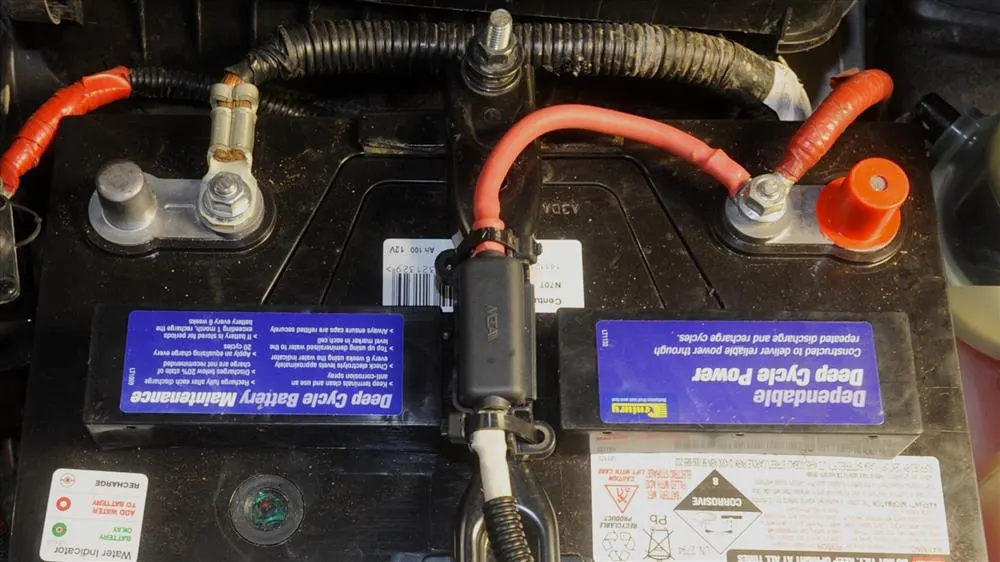If you frequently use your winch for heavy-duty tasks or have other power-hungry accessories, a dual battery setup ensures reliable performance and prevents draining your vehicle’s main battery. For occasional or light use, a high-quality single battery might suffice.
This article delves into the power requirements of winches, the pros and cons of different battery setups, and considerations for maintaining an optimal electrical system.
Single Battery vs. Dual Battery Setup

Pros and Cons of Single Battery Systems
Using a single battery system has its benefits and drawbacks. One of the main advantages is simplicity. A single battery setup is straightforward, cheaper to install, and easier to maintain.
This kind of system is usually sufficient for light to moderate winching tasks. If you don’t use your winch very often or if you only use it for light-duty tasks, a single battery might be all you need.
However, there are some significant downsides. When faced with high-demand scenarios, such as heavy-duty winching or prolonged use, a single battery system might struggle.
The heavy power draw from the winch can deplete the battery quickly, potentially leaving you stranded if the battery runs out of power.
Additionally, this can put extra strain on your vehicle’s electrical system, possibly affecting other components that rely on battery power.
Advantages of Dual Battery Setups for Winching
A dual battery setup offers several advantages, especially for those who frequently use their winch or use it for demanding tasks. One of the key benefits is the extra power and reliability it provides.
With two batteries, you have a dedicated power source for the winch, ensuring it operates efficiently without draining the primary battery that powers your vehicle’s essential systems.
This setup is particularly beneficial for heavy-duty winching or frequent use, where the power demands are much higher.
A dual battery system reduces the risk of power depletion, providing a backup battery that can take over if the primary battery is drained. This ensures that your vehicle remains operational, even during intense winching activities.
When a Single Battery Might Be Sufficient
In some cases, a single battery might still be sufficient, even if you use a winch. If you only use the winch occasionally and for light-duty tasks, a high-quality single battery can often handle the load.
Vehicles with robust electrical systems and minimal additional power demands can also manage well with a single battery setup.
For instance, if your vehicle has a powerful alternator and you don’t have many other accessories drawing power (like auxiliary lights or a fridge), a single battery might be enough to support both your winch and your vehicle’s other electrical needs.
Also check: Best winch battery for the money
Factors to Consider When Deciding on Dual Batteries
Frequency of Winch Use
How often you use your winch plays a significant role in determining whether you need a dual battery setup.
If you frequently find yourself in situations where you rely on your winch, such as off-roading or heavy-duty towing, investing in a dual battery system becomes almost essential.
Frequent use means your winch will regularly draw substantial power, which can quickly deplete a single battery, especially during extended winching sessions.
A dual battery setup ensures you have a consistent and reliable power source, reducing the risk of running out of power when you need it most.
This setup provides peace of mind, knowing that you have the necessary backup to support heavy and frequent winching activities.
Type and Size of Winch
The type and size of your winch are critical factors in deciding on a dual battery system. Larger winches with higher pulling capacities require significantly more power to operate efficiently.
For example, a winch rated for heavy-duty tasks will draw more amperage compared to a smaller, light-duty winch.
If you have a powerful winch designed for challenging tasks, a single battery may not provide sufficient power, especially during prolonged use.
A dual battery setup can supply the necessary power to ensure your winch operates at its full potential without overloading your vehicle’s electrical system.
It’s important to match your battery system to the specific power requirements of your winch to ensure optimal performance.
Vehicle’s Existing Electrical System
The existing electrical system of your vehicle is another important consideration. Vehicles equipped with high-output alternators and robust batteries can handle winch demands better than those with standard electrical systems.
A high-output alternator can produce more electrical power, which helps in maintaining battery charge levels even when the winch is in use.
If your vehicle’s electrical system is already strained with standard components, adding a winch to the mix could push it beyond its limits.
In such cases, upgrading to a dual battery setup can provide the additional power needed without overburdening the existing system.
It ensures that your vehicle’s primary electrical functions remain unaffected while providing ample power for winching.
Other Power-Hungry Accessories
Consideration of other power-hungry accessories on your vehicle is crucial when deciding on a dual battery setup.
Many off-road and adventure vehicles are equipped with various accessories that draw significant power, such as auxiliary lights, refrigerators, inverters, and sound systems.
These accessories, combined with the power demands of a winch, can quickly deplete a single battery. A dual battery setup helps manage the overall power load by distributing the demand across two batteries.
This ensures that all your accessories and the winch have sufficient power without compromising the vehicle’s primary electrical needs.
By having a dedicated auxiliary battery for accessories and winching, you can prevent power shortages and ensure smooth operation of all your equipment.
Dual Battery Options for Winching
Dedicated Winch Battery
A dedicated winch battery is designed to power just the winch. This setup ensures that the winch always has a reliable power source without affecting the main battery that runs your vehicle’s engine and other electrical components.
By isolating the winch’s power needs, you avoid draining the main battery during heavy winching, which can be crucial in demanding situations.
Auxiliary Battery Systems
Auxiliary battery systems provide extra power for the winch and other electrical accessories. These systems are versatile, supporting not only the winch but also additional equipment like auxiliary lights, fridges, and other power-hungry devices.
Auxiliary battery systems often come with battery isolators, which help manage and distribute power effectively between the main and auxiliary batteries, ensuring that both batteries are used efficiently and that the main battery remains charged.
Battery Isolators and Management Systems
Battery isolators are key components in dual battery setups. They prevent the main battery from draining by isolating it from the auxiliary battery when the vehicle is off. When the vehicle is running, the isolator ensures that both batteries are charged.
Advanced battery management systems take this a step further by monitoring the condition and performance of both batteries, optimizing charging, and managing power distribution.
This helps maintain battery health and ensures that your winch and other accessories have a reliable power source.
FAQ
Can I run a winch off my stock battery?
Yes, but it depends on the winch’s power requirements and your vehicle’s electrical system. For light-duty and occasional use, a stock battery might suffice.
How do I know if my current battery setup is sufficient?
Check the winch’s power requirements and compare them to your battery’s capacity and alternator output. If your battery frequently drains or struggles during winching, consider upgrading.
What size batteries do I need for my winch?
The size depends on your winch’s amperage draw and your vehicle’s electrical system. Consult your winch manufacturer for specific recommendations.
Are lithium batteries good for winching?
Yes, lithium batteries offer high power density, faster charging, and longer life, making them a great choice for winching.
How can I extend my winch’s run time without dual batteries?
Consider alternatives like high-output alternators, capacitor-based systems, or portable power stations to supplement your main battery during winching.
Conclusion
Deciding between a single and dual battery setup for winching depends on your specific needs and vehicle. Understanding the power requirements, considering your winch use frequency, and evaluating your vehicle’s electrical system are crucial steps.
Whether you choose a dual battery system or opt for alternatives, ensuring a reliable power source will enhance your winching experience and overall vehicle performance.

